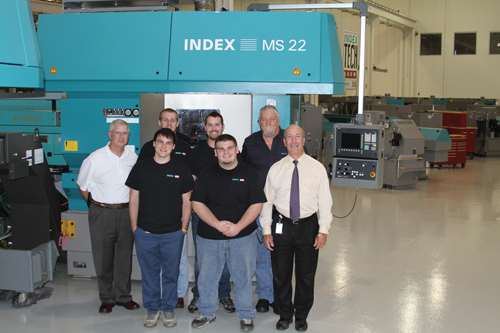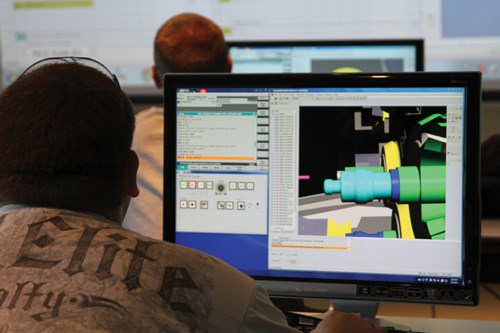Hands-On Training Offers Students Priceless Experience
Machine tool builders are hearing the cries of machine shops (their customers) desperate for skilled workers and are funding educational programs themselves.
#workforcedevelopment
Concerned for the future of their companies, many machine shop managers are in a desperate situation: They need to find interested candidates to learn the essentials of operating today’s machine tools, and they need them soon. Machine tool builders are hearing the cries from these machine shops (their customers), and knowing that the government will not fund programs to help the industry, are addressing the lack of young people being trained on the sophisticated machines and funding programs themselves.
Index Corp. is doing just that. It recently hosted a course for four manufacturing technology students from Vincennes University (Vincennes, Ind.) over a period of 3 weeks and introduced them to the advanced machining technology the company designs and markets at its 100,000 square-foot headquarters in Noblesville, Ind. Index’s president, Jeffrey Reinert, who graduated from Vincennes in 1975, says he will offer the course again.
Featured Content
“Our objectives were to familiarize the students with Index and Traub machine tools,” Mr. Reinert says. “We provided an overview and added to their knowledge base rather than training them on every facet of the machines.”
With the technological advancements represented by CNC machine tools today, the educational requirements needed to work in the CNC machining area have become more stringent. This is one reason why Mr. Reinert felt the need to reach out to students.
With help from Tim Bauer, director, advanced manufacturing at Vincennes Unversity, Index hand-selected four senior-year students who were proficient in manual programming, Mastercam CAD and basic machine operation. Their training has given them practical experience with toolroom machines, Haas single-spindle lathes and five-axis machining centers. The students were primarily from vocational education backgrounds in high school with machine training all 4 years, including manual machines and grinding tools, and basic CNC.
These students—Ethan Masterson, Brian Sheckell, Ryan Stoll and Dalton Williams—who have studied together and have been in competition with each other for the last 2 ½ years, wanted exposure to hands-on machine setup and operation, CAD/CAM software training and programming different types of controls, which at Index is mainly Siemens and Mitsubishi controls.
The new course uses demo parts from Index as training samples, programs the parts using simulation software, machines the part and inspects the parts on equipment that is not available at Vincennes University.
“The course provided the students with enough experience for them to make an interesting and detailed presentation to their classmates,” Mr. Reinert says. “Each of the students intends to work in manufacturing, such as in applications engineering, in a precision CNC shop, in a large-work machine shop or in mining and power plants.”
From Index’s point of view, the company has the opportunity to interact with prospective employees by offering this training.
“The need is to start in high school to introduce manufacturing to capable students, not only to students who may struggle academically,” one student says. “We need to show that there is a future in manufacturing, and it is not really for people who can barely graduate from high school.”
In other high income countries, such as Germany, Austria and Denmark, apprenticeship availability is common for high school graduates. In those countries, companies partner with local schools to operate a program that combines technical training and some traditional academic instruction.
Although once more common in the U.S., these apprenticeship opportunities—using a model based on these foreign countries’ apprenticeships—are opening up again because of manufacturers’ desperate need for skilled workers. Now, more than 20,000 U.S. companies offer apprenticeships.
Although Index doesn’t offer a textbook definition of an apprenticeship, it is initiating a partnership with a vocational school. Mr. Reinert says, “We used no state funding for this training; we are paying the cost ourselves. We believe it’s a smart investment in the long-term success of our company. The investment we make pays off in a workforce of long-term, highly dedicated, highly skilled employees.”
In Mr. Reinert’s eyes, the program was successful, and he plans to repeat it with new students next year at the company’s facility.
RELATED CONTENT
-
Determine Passivation of Stainless
Properly cleaned stainless steel is naturally protected from corrosion by a thin, passive film. But this passive layer can be removed or scratched. A passivation meter measures the surface potential under controlled conditions.
-
Succession Planning: Three 15-Minute Activities to Start Preparing for Tomorrow
Succession planning is planning for the future success of your business.
-
Winning New Jobs With Online Bidding
The digital revolution is hitting the business of the multiple-spindle automatic machining--in two distinct forms, no less. Twenty-five years after the first wave of digitization in manufacturing (numerical control) its linear descendant, computer numerical control or CNC, is changing the way screw machine shops do business.








